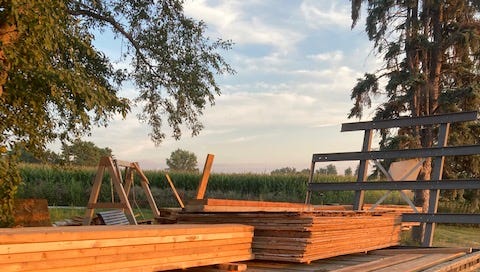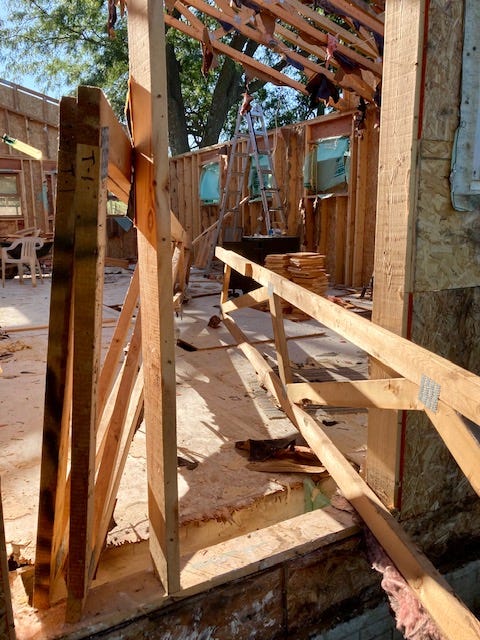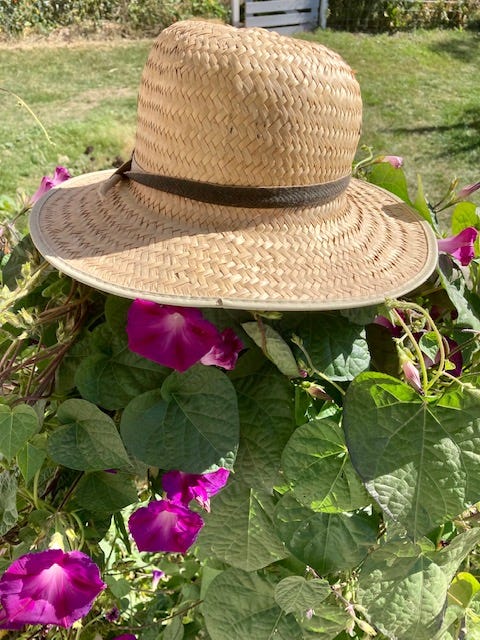Abram Yutzy dismantled my neighbor Donna’s library with just a hammer, board by board, a huge room that she’d added on some 30 years ago. The library had once housed Donna’s husband Stu’s vast collection of books. Then, after 25 years, their marriage dissolved. Stu took off for California. The books went to the local prison.
Last January, Donna went to Florida to visit her son and family. I kept an eye on her horses, making sure they had enough hay and that their water was open.
“Do you want me to check on your house?” I asked.
“No, it will be fine,” Donna said.
A few weeks later, I received an agonizing call from Donna’s local son. Her pipes had frozen, burst, and created a waterfall in the library, flooding most of the house. The heat still on, the place turned into a terrarium, complete with a 5-foot-long bull snake floating through the living room.
A major clean-up effort ensued. Donna flew home, started to work and hired a restoration company whose truck announced themselves as: Top Trauma Service. The house was saved, but Top Trauma wanted to bulldoze the library. Instead, Abram offered to dismantle it and salvage the lumber.
Abram worked alone for weeks, hammer in hand. The beams and joists down, his daughter finally appeared to help lift the lumber into the wagon, her long skirt brushing the dirt.
The next day was the Yutzy reunion. Grossmommies, uncles and aunts, and cousins rolled down the road in their buggies, on bareback, and in carts. On my way home from town, I waved at all the Yutzies—some gathered in clumps near their house eating pie and ice cream, others out playing softball in the field.
How great, I thought, finally these folks are taking a break and having some fun. Then after supper, standing at the window doing my dishes, a squadron of Yutzies amassed at Donna’s. Abram, his wife, and three grown daughters, their husbands, and children were all milling around the library ruins with more hammers and crow bars.
I wandered through the yard to check out the scene. Eight adults, men and women, and an equal number of children were yanking nails from the boards, wedging the heads between the claws of their tools. Swiftly, cleanly, the nails came out, one little boy gathering them into a tin can.
“We were all together at the reunion,” Abram said. “So, we thought we’d come over here and pull the nails.”
A three-year old with a tiny hammer toddled toward his grandmother who was balancing a six-month old baby on her knee. A four-year old boy busied himself in a corner hammering nails back in the boards as fast as his older brother could pull them out.
“Where’s Banjo?” Jolene asked.
Jolene was the only child I could converse with. She has been attending one-school long enough to learn English. The others only spoke Deitsch.
“Banjo’s home in her pen,” I said.
“Bring her over,” Bertha said.
I hesitated, fearing my puppy would be wild with all the commotion. But Banjo was Bonnie pup, the Yutzy’s lovely dog who stood in the doorway to their greenhouse, greeting the customers just like at Wal Mart. Carts are here, she seemed to say. Check-out there.
My old dog had died several years before, and I vowed I wouldn’t get another one unless I could find one like Bonnie. Then Bonnie had pups. Every day for the first 6 weeks of her life, the Yutzy children played and romped with Banjo.
I walked Banjo over to the nail pulling party and the little Amish children raced to her, squealing and laughing. They petted her, pulled her ears, pulled her tail. One tot rode on top of her back, another put his straw hat on her head. Banjo, Banjo, they yelled! Then to their grandmother in Dietsch. Leck, leck. She’s licking my face!
I sat on an overturned bucket in the middle of the nail pulling party until the sun went down and the Amish families piled back in their buggies for home. What fun, I thought, and how unusual for an English person to catch a glimpse of how a communal society makes a boring, mundane task fun.
The scene was a remnant of another era, one before automation, before families narrowed and moved great distances from one another. It was a remnant of a world when cooperation was prized, families worked together, children learned skills from their parents, and neighbor helped neighbor.
Donna didn’t have to pay for the demolition of the library. Instead, the materials were recycled and Abram even made some money. We had a neighborhood event, feeling closer to each other through the antics of children, a dog, crowbars and a hammer.
“I took all that lumber to the auction and got $1,000,” Abram told me later, the library completely vanished, nothing left but dirt covering the old foundation. Donna has now seeded down the site with grass.
Hear the full story on my podcast, Episode #39:
I am honored to be a member of the Iowa Writers Collaborative, a group of dynamic journalists and literary artists throughout the state. Become a paid subscriber to my Substack page and join our monthly informative and fun “Office Lounge” Zoom call. Proceeds from my page go to AgArts, a non-profit I co-founded to imagine and promote healthy food systems through the arts.
Here is the cast of Iowa Writers Collaborative luminaries. Please support them and join us in the “Lounge.”
Laura Belin: Iowa Politics with Laura Belin
Doug Burns: The Iowa Mercury
Dave Busiek: Dave Busiek on Media
Art Cullen: Art Cullen’s Notebook
Suzanna de Baca Dispatches from the Heartland
Debra Engle: A Whole New World
Julie Gammack: Julie Gammack’s Iowa Potluck
Jody Gifford: Benign Inspiration
Beth Hoffman: In the Dirt
Dana James: New Black Iowa
Robert Leonard: Deep Midwest: Politics and Culture
Chuck Offenburger: Iowa Boy Chuck Offenburger
Mary Swander: Mary Swander’s Buggy Land
Ed Tibbetts: Along the Mississippi
Iowa Writers Collaborative: Iowa Writers Collaborative








Great story!